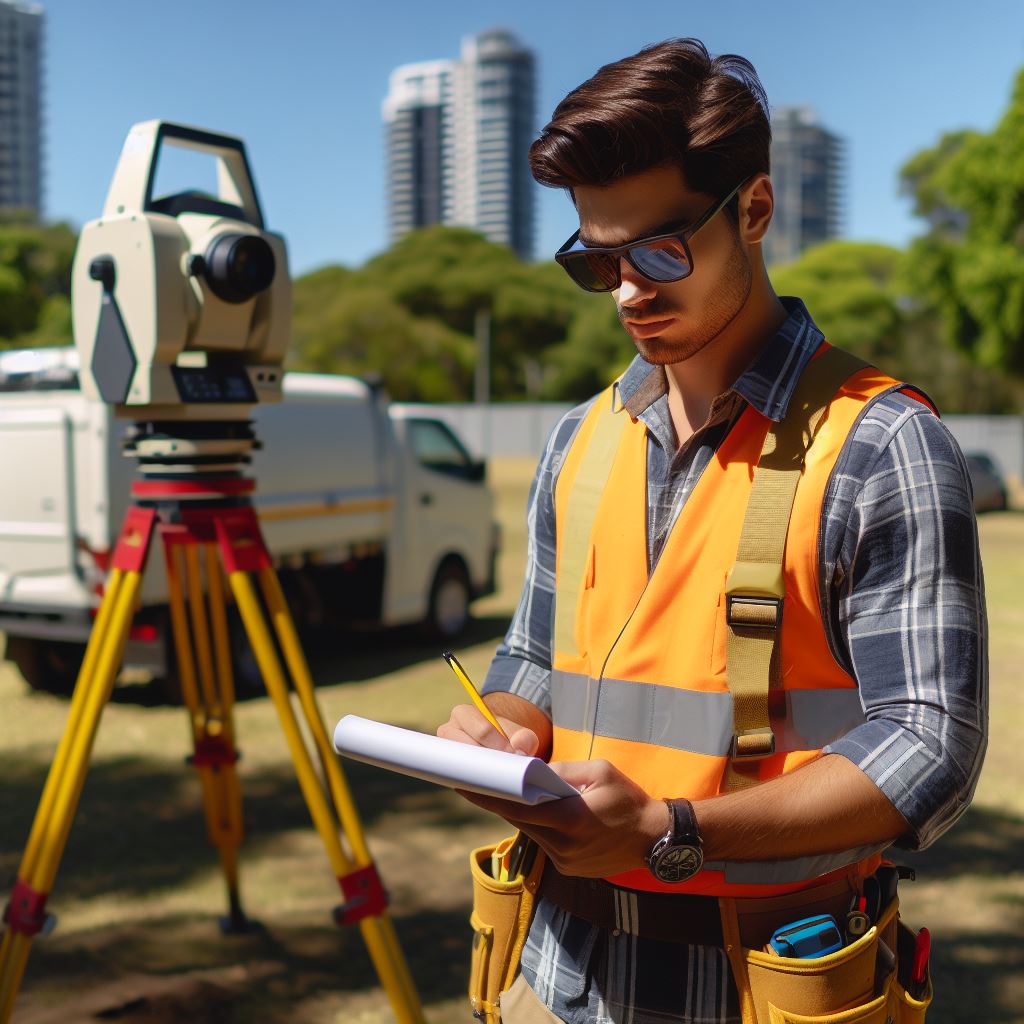Introduction
Surveying laws in Australia play a vital role in regulating the profession and ensuring accurate and reliable measurements.
Understanding these laws is crucial for surveyors and related professionals, as it helps maintain standards and safeguards public interest.
Compliance with these laws is essential for conducting surveys and providing valuable data for various purposes, including land development, infrastructure planning, and legal disputes.
Surveying laws encompass a wide range of regulations, including licensing requirements, standards for accuracy, and code of ethics.
These laws aim to ensure that surveys are carried out by competent professionals who adhere to ethical practices and use accurate and reliable measuring instruments.
By following these laws, surveyors can ensure the integrity of their work and provide trustworthy data, which is essential for making informed decisions in various industries.
Moreover, understanding these laws also helps surveyors protect their professional reputation and avoid legal issues that may arise due to non-compliance.
Overall, surveying laws in Australia provide a framework that promotes excellence and reliability in the profession, benefiting both surveyors and the public.
It is crucial for surveyors and related professionals to stay updated with any changes in these laws to uphold the highest standards and provide quality services.
Role of Surveying Laws in Australia
Purpose of surveying laws
Surveying laws play a crucial role in Australia by providing a framework for land development and management.
They ensure that surveying activities are carried out in a fair and transparent manner, promoting public trust and confidence in the process.
Protection of public and property rights
Surveying laws in Australia aim to protect the rights of both the public and property owners.
By regulating boundaries, easements, and other land-related matters, these laws prevent conflicts and disputes, ensuring a stable environment for property ownership.
Ensuring accuracy and reliability in surveying services
Australia’s surveying laws set standards and requirements for surveyors to ensure accuracy and reliability in their services.
These laws cover various aspects, such as professional qualifications, methodologies, and the use of precise instruments, promoting high-quality surveying outcomes.
Read: Project Management Tips for Architects
Key Surveying Laws in Australia
The field of surveying in Australia is governed by a comprehensive framework of laws and regulations. One of the key legislations in this field is the Surveying and Spatial Information Act 2002.
This Act plays a crucial role in governing the surveying profession and ensuring the accuracy and integrity of surveying activities.
Surveying and Spatial Information Act 2002
Overview of the act
The Surveying and Spatial Information Act 2002 is a crucial legislation in Australia governing the surveying profession.
The Surveying and Spatial Information Act 2002 provides an overview of the legislation and its objectives.
It establishes the legal framework within which surveyors operate, addressing key aspects of the surveying profession.
The Act defines the authority and responsibilities of surveyors, ensuring that they possess the necessary skills and qualifications to perform surveys accurately.
Authority and responsibilities of surveyors under the act
The Act grants authority to licensed surveyors to perform surveys and establishes their responsibilities in ensuring accuracy and integrity in surveying.
Your Personalized Career Strategy
Unlock your potential with tailored career consulting. Get clear, actionable steps designed for your success. Start now!
Get StartedUnder the Act, surveyors are granted the authority to perform surveys and create survey plans.
They must adhere to specific requirements outlined in the legislation to ensure the accuracy and reliability of survey data.
This includes using appropriate surveying techniques, equipment, and methodologies to achieve precise measurements.
To practice surveying in Australia, individuals must meet certain licensing and registration requirements specified in the Act.
These requirements ensure that only qualified professionals are authorized to perform surveying tasks.
This helps maintain the integrity of the profession and protects the interests of the public relying on surveying services.
Licensing and registration requirements
Under this Act, surveyors must meet specific licensing and registration requirements to legally practice surveying in Australia.
In addition to the Surveying and Spatial Information Act 2002, each Australian state and territory has its own set of surveying regulations.
These regulations supplement the overarching legislation and address specific regional considerations.
While there are similarities in surveying requirements across regions, variations exist to accommodate local conditions and needs.
Surveying Regulations in each state and territory
Overview of specific regulations in each region
The specific regulations in each region cover various aspects of surveying, such as cadastral surveying, engineering surveying, and land development.
Understanding these regulations is essential for surveyors operating in different states and territories to ensure compliance with local requirements.
Variations and similarities in requirements
Compliance with surveying laws is crucial to maintaining the accuracy and reliability of survey data. To enforce compliance, various mechanisms are in place, as outlined in the legislation.
These mechanisms include regular inspections, audits, and investigations to ensure surveyors are adhering to the required standards.
Compliance and enforcement mechanisms
Non-compliance with surveying laws can result in penalties, including fines and potential suspension or revocation of a surveyor’s license.
These enforcement measures are in place to protect the public’s interests and maintain the integrity of the surveying profession.
In short, the Surveying and Spatial Information Act 2002 and additional state and territory regulations form the foundation of surveying laws in Australia.
These laws provide the necessary framework for surveyors to practice their profession responsibly and ensure the accuracy and integrity of surveying activities.
Adhering to these laws is vital for surveyors to maintain their professional standing and provide reliable and accurate survey data to clients and the public.
Read: Surveying 101: An Aussie’s Intro to the Field
Stand Out with a Resume That Gets Results
Your career is worth more than a generic template. Let us craft a resume and cover letter that showcase your unique strengths and help you secure that dream job.
Get HiredSee Related Content: Eco-Friendly Drafting: Australia’s New Edge
Important Considerations for Surveyors
As surveyors in Australia, there are several important considerations that you must keep in mind to ensure professional excellence and legal compliance.
This secytion will delve into two crucial aspects: professional standards and ethics, as well as liability and legal obligations.
Professional standards and ethics
Code of Conduct for surveyors
Surveyors in Australia are expected to adhere to a Code of Conduct that outlines their professional responsibilities.
This code provides a set of guidelines that promotes ethical behavior and practices within the surveying industry.
It encompasses a range of areas, including confidentiality, integrity, objectivity, and conflict of interest.
By following this code, surveyors can maintain public trust in their work and uphold professional standards.
Ethical considerations in surveying practice
Ethics play a pivotal role in surveying practice.
Surveyors must consider the ethical implications of their actions and decisions.
They are responsible for conducting surveys that yield reliable and unbiased results.
It is essential to maintain impartiality and avoid any conflicts of interest.
By prioritizing ethical considerations, surveyors can build a reputable reputation and contribute to the integrity of the surveying profession.
Liability and legal obligations
Avoiding errors and negligence
Surveyors must take all necessary precautions to avoid errors and negligence in their work.
Accurate measurements and precise data collection are fundamental to producing reliable survey results.
Diligence, attention to detail, and adherence to professional standards are essential in mitigating potential errors.
By maintaining high-quality work, surveyors can minimize the risks of liability and legal disputes.
Understanding potential legal consequences
Surveyors need to be aware of the potential legal consequences their work may entail.
Failure to meet professional standards or provide accurate information can result in legal disputes, monetary damages, or reputational harm.
Familiarizing themselves with the laws, regulations, and legal frameworks relevant to their surveying activities is crucial.
By understanding the legal landscape, surveyors can effectively navigate potential legal issues and protect their interests.
In fact, surveyors in Australia must give due importance to professional standards, ethics, liability, and legal obligations.
Adhering to the Code of Conduct and ethical considerations enables them to maintain their integrity and credibility within the industry.
Furthermore, being mindful of potential legal consequences helps surveyors protect themselves and their clients from any legal challenges.
By prioritizing these considerations, surveyors can uphold professionalism, deliver high-quality work, and contribute to the development of the surveying field.
Read: Challenges Faced by Modern Architects

Gain More Insights: Freelance Drafting in Australia: Pros and Cons
Resources and Support for Surveyors
In addition to formal education and knowledge of surveying laws, surveyors in Australia can utilize various resources and support systems.
These resources can aid in their professional development and enhance their understanding of the regulatory landscape.
Professional organizations and associations
One way for surveyors to connect with fellow professionals and gain valuable insights is by joining relevant associations and professional organizations.
These organizations provide a platform for surveyors to network and exchange ideas, information, and experiences. The benefits of joining such associations are manifold.
Benefits of joining relevant associations
By becoming a member, surveyors can stay updated on industry trends and developments.
Networking opportunities and continuous professional development
Associations offer events, conferences, and seminars that help surveyors expand their network and learn from experts in the field.
Continuous professional development through these associations ensures that surveyors are up to date with the latest practices and techniques.
Being part of these organizations not only enhances professional growth but also provides a supportive community where surveyors can share their challenges and successes,.
Furthering the collective knowledge of the industry.
Government resources and assistance
Surveyors can also rely on government resources and support to complement their work.
The government has various websites, publications, and guidance available that can aid surveyors in their day-to-day operations and decision-making processes.
Useful websites, publications, and guidance
Government websites offer access to a wealth of information on surveying laws, regulations, and industry standards.
Publications and guidance documents provide practical advice and clarification on specific topics, ensuring surveyors have reliable resources at their disposal.
Transform Your LinkedIn for Maximum Impact
Elevate your professional brand with a LinkedIn profile that attracts recruiters, showcases your expertise, and maximizes opportunities. Stand out in your industry with a profile built for success.
Boost ProfileAccess to government support for surveyors
The government recognizes the importance of surveyors and provides support through funding, grants, or subsidies for specific projects.
These financial resources can assist surveyors in their work and contribute to the overall growth of the industry.
By utilizing these government resources, surveyors can stay informed, enhance their knowledge, and navigate the complexities of surveying laws in Australia more effectively.
This support system reinforces the crucial role surveyors play in infrastructure development, land management, and urban planning.
To summarize, surveyors in Australia have access to a wide range of resources and support systems.
Engaging with professional organizations and associations allows them to stay connected with industry updates, expand their network, and continuously develop professionally.
Government resources, on the other hand, provide valuable information, guidance, and financial support that can aid surveyors in their daily operations and contribute to their overall success.
By leveraging these resources, surveyors can enhance their expertise and ensure they comply with the laws and regulations governing their profession.
Read: Architecture Licensing in Australia Explained
Gain More Insights: Mechanical Engineering Graduates’ Guide
Conclusion
Recap of the importance of surveying laws in Australia
Surveying laws in Australia play a crucial role in ensuring the accuracy and reliability of land measurements.
They provide a legal framework for surveyors to adhere to, promoting standardization and consistency in the profession.
Compliance with these laws is essential for maintaining public trust and confidence in surveying practices.
Encouragement for surveyors to stay updated and comply with regulations
Surveyors must stay abreast of any changes or updates to surveying laws in Australia to stay in compliance.
Continuing education and professional development are vital to ensure surveyors possess the necessary knowledge and skills required by these laws.
By doing so, surveyors can maintain their professionalism and credibility in the industry.
Final thoughts on the guide to surveying laws in Australia
This guide serves as a valuable resource for surveyors, providing a comprehensive overview of the laws and regulations governing their profession.
It highlights the importance of understanding and adhering to these laws to ensure accurate and reliable surveying practices.
By following this guide, surveyors can navigate the legal landscape with confidence and contribute to the integrity of the industry.




